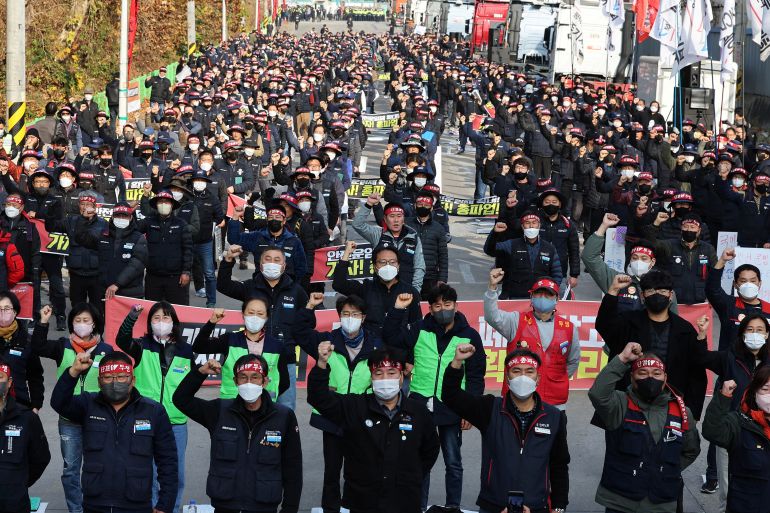South Korea to hold first talks with striking truckers on Monday
The South Korean government says the strike is causing daily losses of 300 billion won ($224m).

South Korea’s government will meet a striking truckers’ union for the first talks of a five-day nationwide walkout, as supply chain glitches worsen and concrete runs out at building sites.
The government, which estimates daily losses at about 300 billion won ($224m) as supplies of cement and fuel for filling stations run short, raised its warning of cargo transport disruption to the highest level.
Keep reading
list of 4 itemsThousands strike for wage increases in South Africa
UK lecturers, teachers, postal workers begin strike over pay
How can governments respond to an increasing number of strikes?
But the union held out little prospect of a breakthrough in the second major strike within less than six months, as thousands of truckers demand better pay and working conditions.
“The transport ministry’s position is already set, and there is no room for negotiations, so this meeting is not a negotiation … the content is a demand for an unconditional return to work,” the union said in a statement on Sunday.
The strike is disrupting industrial activity at a time when Asia’s fourth-largest economy, which is dependent on exports, faces lower-than-expected growth next year, with the central bank having downgraded its 2023 forecast to 1.7 percent from 2.1 percent.
“We need to establish a rule of law between labour and management,” President Yoon Suk-yeol Yoon said on Monday, according to the presidential office.
Yoon, who has criticised the strike as taking the nation’s logistics “hostage” in the face of an economic crisis, will hold a cabinet meeting on Tuesday to consider ordering the truckers to return to their jobs, his office said.
The law allows the government to issue such an order during a serious transport disruption, and failure to comply can be punished with up to three years in jail or a fine of up to 30 million won ($22,550).
The strike organiser, Cargo Truckers Solidarity Union (CTSU), has criticised the government for being unwilling to expand a minimum-pay system beyond a further three years, instead of meeting union demands to make it permanent and widen its scope.
Container traffic at ports was 21 percent of normal levels by 10am on Monday, the transport ministry said, against Friday’s figure of 49 percent.
The steel industry, including POSCO and Hyundai Steel, saw shipments more than halve to 22,000 tonnes on Sunday, down from the usual average of 46,000 tonnes, the transport ministry said.
Some filling stations could run out of petrol and kerosene as early as this week, especially in large cities, despite supplies secured before the strike.
That is because 70-80 percent of truckers for major refiners, such as SK Innovation’s SK Energy and S-Oil Corp, are union members on strike.
Since last week, 259 out of 459 building sites have suspended ready-mix concrete work, the Yonhap news agency said, while the transport ministry said most sites were expected to run out by Tuesday.
The cement industry estimated an accumulated output loss of about 46.4 billion won ($35m) by Saturday, with shipments down to 9 percent of usual levels, the Korea Cement Association said.
“Non-union bulk cement truck owners, who are implicitly sympathetic to, or in fear of, the cargo union’s illegal activities, are giving up cement transport,” the lobby group said in a statement.